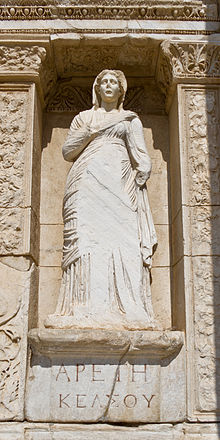| Arete | |
|---|---|
Goddess of excellence and virtue | |
| Member of The Praxidicae | |
 Statue of Arete in Celsus' Library in Ephesus, 2nd century AD | |
| Gender | Female |
| Genealogy | |
| Parents | Praxidice and Soter |
| Siblings | Homonoia |
| Equivalents | |
| Roman | Virtus |
Arete (Ancient Greek: ἀρετή, romanized: aretḗ) is a concept in ancient Greek thought that, in its most basic sense, refers to "excellence" of any kind[1]—especially a person or thing's "full realization of potential or inherent function."[2] The term may also refer to excellence in "moral virtue."[1]
The concept was also occasionally personified as a minor goddess, Arete (not to be confused with the mythological Queen Arete), who, together with sister Homonoia, formed the Praxidikai ("Exacters of Justice").
In its earliest appearance in Greek, this notion of excellence was bound up with the notion of the fulfillment of purpose or function: living up to one's potential. A person of arete is of the highest effectiveness; such a person uses all of their faculties—strength, bravery, and wit—to achieve real results. In the Homeric world, arete involves all of the abilities and potentialities available to humans. Though particularly associated with "manly" qualities,[1] the Homeric usage of the term was not necessarily gender-specific, as Homer applied the term to both the Greek and Trojan heroes as well as major female figures, such as Penelope, the wife of Greek hero Odysseus. In the Homeric poems, arete is frequently associated with bravery, but more often with effectiveness.
In some contexts, arete is explicitly linked with human knowledge, where the expressions "virtue is knowledge" and "arete is knowledge" are used interchangeably. In this sense, the highest human potential is knowledge, and all other human abilities derive from this central capacity. If arete is knowledge, the highest human knowledge is knowledge about knowledge itself. In this light, the theoretical study of human knowledge, which Aristotle called "contemplation", is the highest human ability and happiness.[3]
- ^ a b c Liddell, H. G.; Scott, R., eds. (1940). "ἀρετή". A Greek–English Lexicon (9th ed.). Oxford: Oxford University Press.
- ^ "Arete: definition and meaning". Collins English Dictionary. 5 July 2023. Retrieved 5 July 2023.
- ^ Aristotle. "X: Conclusion". Nicomachean Ethics.